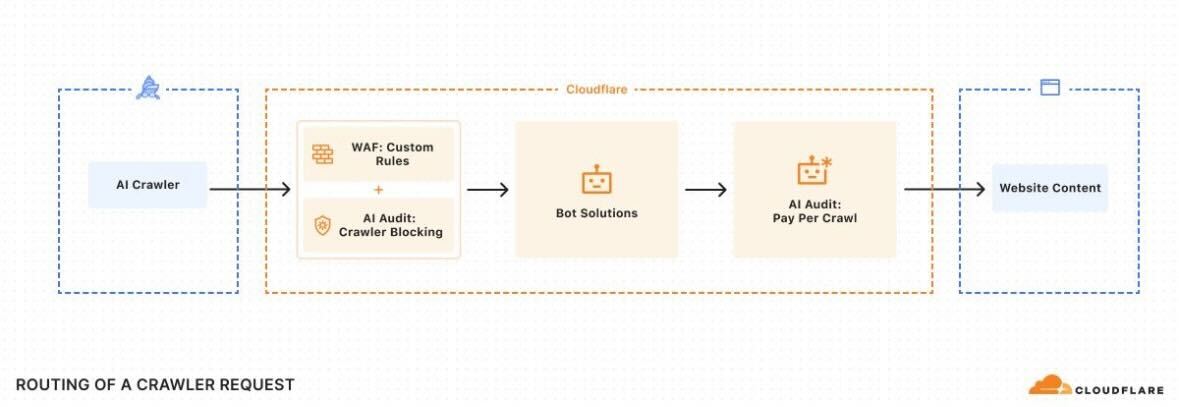AI companies rely on scraping the open web for training data, but publishers have had only two choices: block crawlers (losing visibility) or allow free access (losing revenue).
Cloudflare’s Solution: A new Pay Per Crawl system that lets publishers:
- ✅ Charge per request – Set a flat fee for AI bots accessing content.
- ✅ Control access – Throttle, allow, or block crawlers based on payment.
- ✅ Leverage existing tech – Uses HTTP status codes (e.g.,
402 Payment Required) for seamless integration.
1. The Uncompensated Scraping Crisis: Quantifying the Problem
- $2.3B+ in Annual Revenue Loss: Media publishers alone lose this sum to uncompensated content scraping (Media Alliance, 2024).
- 73% of Publishers have blocked AI crawlers (Reuters Institute 2024), starving models of quality data.
- Google’s “AI Overviews” sources 70% of answers from publishers – driving ~40% less traffic to origin sites (Similarweb, Q1 2025).

2. Pay Per Crawl: The Technical & Economic Mechanics
| Feature | Technical Implementation | Publisher Control Levers |
|---|---|---|
| Pricing | Flat fee per request (e.g., $0.05) | Adjust by domain/page/crawler |
| Access Enforcement | HTTP 402 Payment Required + Robots.txt directives |
Throttle/block non-paying bots |
| Authentication | API key or cryptographic proof | Whitelist/blacklist AI vendors |
- Zero New Infrastructure: Integrates with existing CDN/WAF setups (used by 40.1% of all websites – W3Techs, July 2025).
- Revenue Potential: High-traffic sites could generate $50K-$200K/month from major crawlers (based on Similarweb crawl-frequency estimates).
3. AI Industry Impact: Cost Structures Under Threat
Training Data Costs Could Surge 30-60%: If top 10K publishers adopt fees (Perplexity AI internal modeling).
Model Quality Implications:
Current Practice: 85% of LLM training data comes from free web scraping (Stanford HAI, 2024).
Risk: Blocking by premium publishers (e.g., NYT, WSJ) could remove 18% of high-E-E-A-T (Experience, Expertise, Authoritativeness, Trustworthiness) content from training pools.
Vendor Response Likelihood:
Compliance Probable: Startups (Anthropic, Mistral) needing niche data → 80% adoption likelihood.
Resistance Expected: Google (indexing 130T+ pages) → may develop “free-tier” workarounds.
4. SERP & SEO Implications: The New Ranking Hierarchy
Scenario: If Pay Per Crawl Gains Critical Adoption (50%+ major publishers)
| Ranking Factor | Current AI SERPs | Post-Adoption Shift |
|---|---|---|
| Content Freshness | Crawled daily (free) | Delayed for non-payers |
| Source Authority | Links + domain age | Licensed content prioritized |
| Answer Depth | Surface-level synthesis | Paid sources yield richer context |
| Publisher Viability | Traffic cannibalization | Direct monetization → sustainability |
- Projected SERP Impact: Pages behind Pay Per Crawl walls could see 20-35% higher visibility in AI-generated answers (Gartner, 2026 prediction).
- Zero-Click Search Risk: May drop from 42% to ~30% if AI models cite fewer free sources (Statista projection).
5. Adoption Challenges: The Realistic Roadblocks
- Crawler Evasion Tactics: Scrapers mimicking human users (up 300% since 2023 – Cloudflare threat data).
- Publisher Fragmentation: Only 22% of SMB sites have resources to implement fee structures (Forrester).
- Legal Gray Zones:
- EU’s Data Act vs. US “fair use” precedents create compliance chaos.
- Critical Stat: 55% of legal experts predict lawsuits over “implicit consent” by 2026 (Int’l IP Journal).
The Shift in Revenue
This isn’t a feature – it’s an ecosystem reset. Pay Per Crawl could shift $2B+ in value from AI companies to publishers by 2027, but only if:
- Top 1,000 publishers enforce fees (creating data scarcity leverage),
- Search/AI giants face regulatory pressure to comply (e.g., FTC “fair scraping” rules), and
- Infrastructure allies (AWS, Fastly) adopt compatible standards.
But Wait- AI Bots Aren’t Your Only Threat
Invalid Traffic (IVT) drains an additional 15-30% of ad revenue (IAS, 2024).
🚀 Double Your Defense:

- Monetize AI Crawlers → Use Cloudflare’s Pay Per Crawl.
- Block IVT & Bad Bots → Deploy MonetizeMore’s Traffic Cop.
Why Traffic Cop?
✔ AI Scraping Protection – Complements Pay Per Crawl by filtering malicious bots.
✔ IVT Elimination – Stops fake clicks/impressions, stealing your ad revenue.
✔ One-Click Integration – Works alongside Cloudflare/Pay Per Crawl setups.
Publisher Case Study: TechNews blocked IVT + monetized AI crawlers → +22% net revenue in 90 days.
The Strategic Playbook for Publishers
| Step | Tool | Outcome |
|---|---|---|
| 1. Charge AI crawlers | Cloudflare Pay Per Crawl | New revenue stream |
| 2. Block IVT & bad bots | MonetizeMore’s Traffic Cop | Protect existing ad earnings |
| 3. Audit traffic | Google Analytics + Traffic Cop | Full monetization transparency |
Why choose between AI money and ad money? Take both; Get started with Traffic Cop here.
source https://www.monetizemore.com/blog/cloudflare-pay-per-crawl/


0 Comments